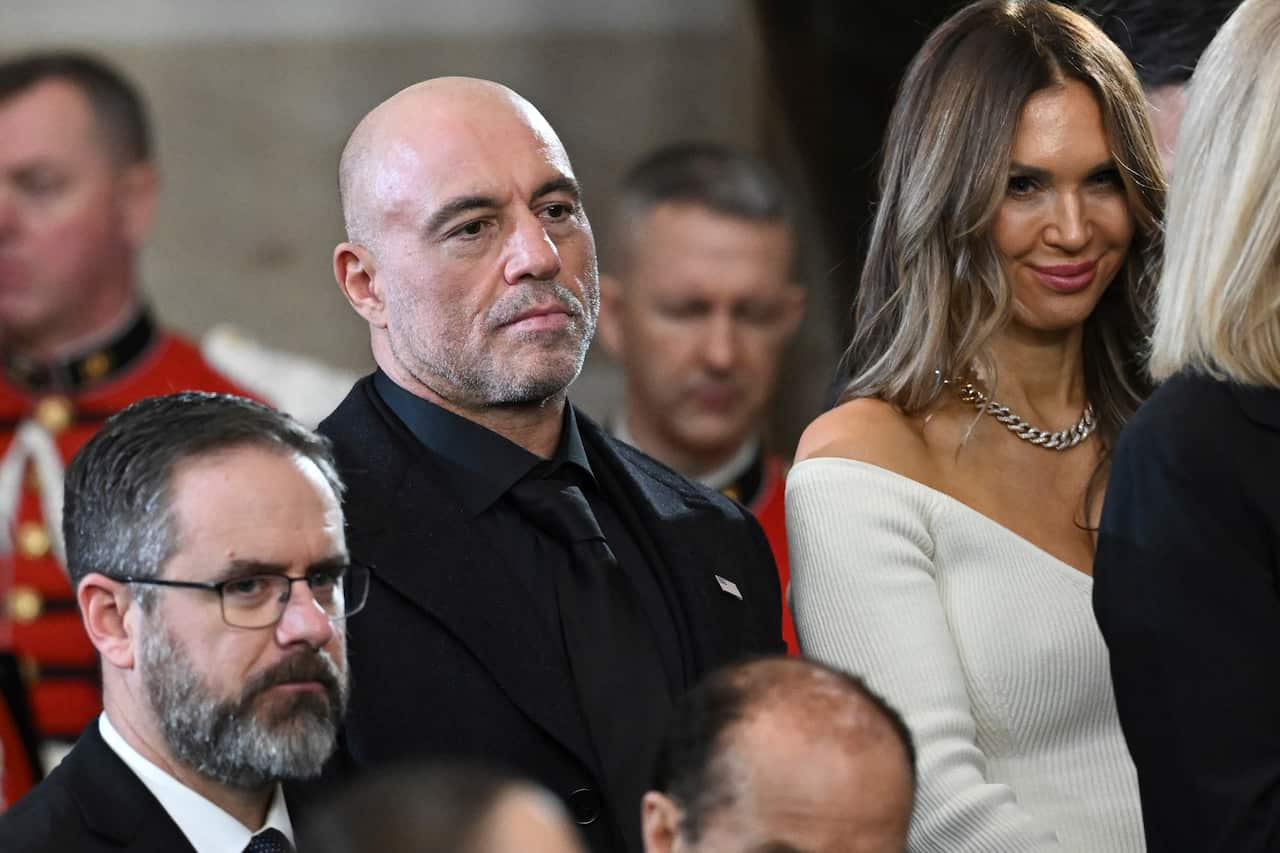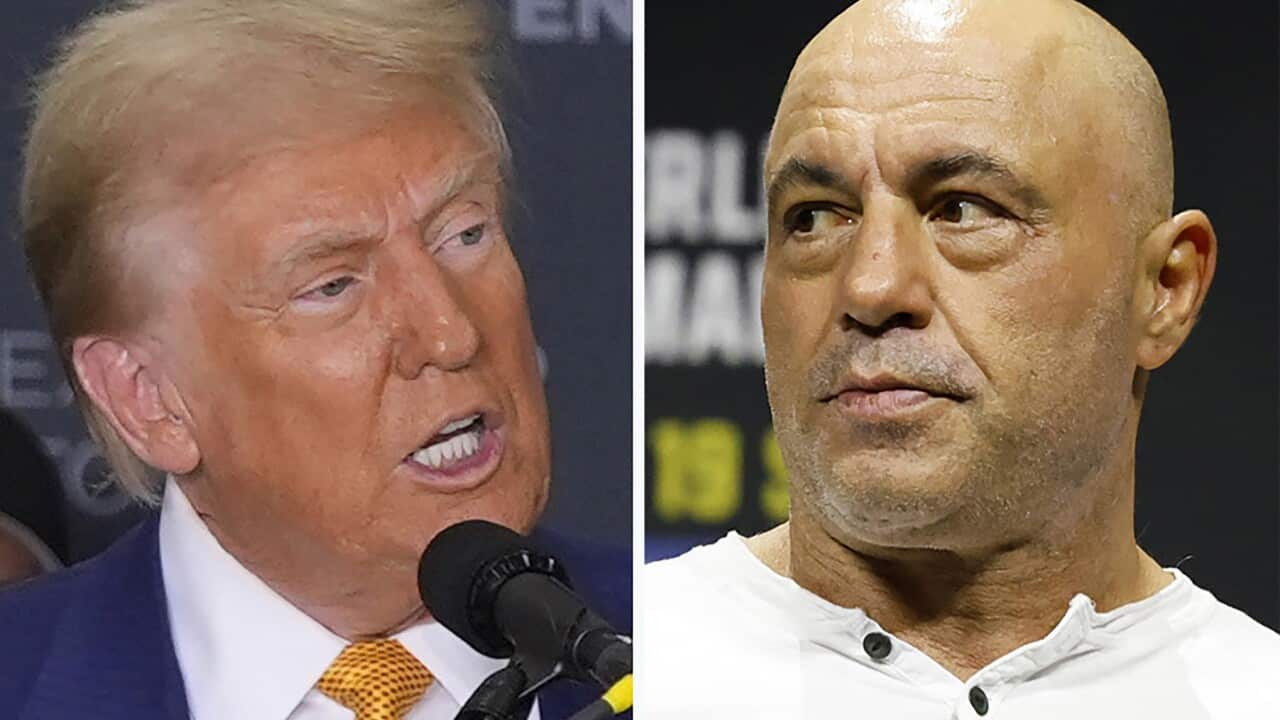United States President Donald Trump has said he "never had the privilege" of visiting Jeffrey Epstein's island, dismissing any alleged links to the convicted sex offender as a "hoax".
But podcast giant Joe Rogan has called the Trump administration's refusal to release more information from the Epstein files a "line in the sand" for supporters.
Still, an expert says Trump's approach is a familiar, "tried-and-true tactic" to deflect and distract. And even criticism from one of the world's most influential podcasters might not be enough to shift his fan base.
Trump calls Epstein link a 'hoax', 'never had the privilege' of visiting the island
Speaking with reporters overnight during a trip to Scotland, Trump said he "never had the privilege" of visiting Epstein's island, saying he turned down an invitation from Epstein in what he says was a moment of good judgement.
The remarks were his latest effort to distance himself from the political furore over his administration's handling of files related to Epstein's case and renewed questions over his past relationship with the disgraced financier, whose death in a New York jail in 2019 was ruled a suicide by US authorities.
"I never had the privilege of going to his island, and I did turn it down," Trump said.
"In one of my very good moments, I turned it down."
Epstein owned a private island in the US Virgin Islands where he entertained prominent people from politics, business and entertainment. Prosecutors have alleged he used the compound to conceal the sex trafficking and abuse of underage victims.
Trump, who socialised with Epstein in the 1990s and early 2000s, also offered new insight into why their relationship ended, saying he cut ties after Epstein "stole people that worked for me".
He also dismissed the story as "a hoax that's been built up way beyond proportion".
The Trump 'playbook'
Dr Emma Shortis is director of the Australia Institute’s International and Security Affairs Program. She says Trump is adopting a "tried and true" strategy that includes attacking critics, testing loyalty, and doubling down on conspiracy theories.
In particular, she says his decision to call the story a "hoax" plays into tactics he has adopted in previous scandals.
"It's his way of speaking to a deeply ingrained conspiracy theory that partly explains his rise to power," she told SBS News.

Previously, Trump used the word "hoax" to criticise reports of Russian interference in his 2016 election campaign. He also claimed the COVID-19 pandemic was a hoax used for political gain by the US Democratic Party.
Shortis added that these conspiracies have also extended to his opposition as a way to "pivot" from any heat. In the past, this included racist conspiracies about the birthplace of former US president Barack Obama, and false claims that 2016 presidential candidate Hillary Clinton was trafficking children, now known as 'Pizzagate', which was later fuelled by the far-right conspiracist group QAnon.
Some followers of the MAGA — Make America Great Again — movement believe in the false claim that the United States is secretly controlled by a group of elites who are paedophiles, sex traffickers and satanists. QAnon believe that Trump is a heroic figure fighting the elite paedophile ring.
Shortis says Trump is "under pressure" and that it's an issue he wants to "go away".
"But of course, he can't stop talking about it, as is Trump's style," she said. "He's compelled by a news cycle … and attempting to weaponise the narrative."
"So I think he will keep coming back to it — sometimes because he's forced to and sometimes because he can't resist engaging, particularly in conspiracy."
Will Donald Trump lose supporters?
Podcaster Joe Rogan, who has 20 million subscribers on YouTube and 14.5 million followers on Spotify and has historically supported Trump due to his anti-establishment views, also voiced criticism about Trump's handling of the story.
Rogan said the Trump administration's refusal to release more information was a "line in the sand".
The White House has been under growing pressure from Trump's supporters and political opponents to release more information about the US justice department's investigation into Epstein.
After US attorney general Pam Bondi earlier this year promised to release additional materials related to possible Epstein clients and the circumstances surrounding his death, the department reversed course this month and issued a memo concluding there was no basis to continue investigating and no evidence of a client list.
Epstein's name was mentioned over 40 times in the latest episode of The Joe Rogan Experience — the most popular podcast in the world, also topping Australian charts last year.
Referring to an episode with FBI director Kash Patel last month, Rogan criticised the release of film footage from Epstein's cell, meant to dispel theories about his death.
"The film has a f---ing minute missing from it," Rogan said in the latest episode. "Do you think we’re babies?"

But Shortis says that while Joe Rogan’s criticism is vocal, it probably won’t shift Trump’s broader support, which is anchored in more entrenched ideological factions.
"The MAGA coalition has always been a loose one — from the white supremacist, extreme right wing end of the political spectrum, through to the more libertarian end of the spectrum — the kind of people that supported Trump because he said he was going to take down this deep state and end American interventionism," Shortis said.
"Rogan occupies that more libertarian end, which is why he's responding this way to the Epstein issue and seeing it as a betrayal."
But she says that ultimately, the criticism may not mean a total abandonment of Trump.
"When you have a base so deeply enmeshed in these conspiracy theories that there is a deep state out to get Trump, turning that around and saying the president has betrayed us is not just a question of admitting you are wrong and that you'd misjudged Trump, it's a question of core identity."
"It's unlikely that the broader base would turn on him as a result of this issue … I think that's potentially based on an old understanding of how politics works in the US."
Meanwhile, overnight, Trump has asked a United States judge to order a swift deposition for Australian-American media mogul Rupert Murdoch in the president's defamation lawsuit against the Wall Street Journal (WSJ) over its 17 July article about Trump's relationship with Epstein.
Trump sued the WSJ and its owners, including Murdoch, for asserting Trump's name was on a 2003 birthday greeting for Epstein that included a sexually suggestive drawing and a reference to secrets they shared.
But Shortis says suing people is a fundamental tactic that Trump uses as a show of strength, including in this scenario. "Outlets like Fox News, they know where the market is and the market is in loyalty to Trump — that's what they'll follow," she said.
'They make him stronger'
While the Epstein case continues to spark backlash, Shortis says there's little evidence it will cause lasting political damage to Donald Trump — especially given his long history of surviving scandal.
"They make him stronger. They increase his hold over the base. They increase the loyalty of the people around him and help him to consolidate his power," she said.
Shortis said Trump has been "very careful to surround himself with complete loyalists" heading into a second term — learning what he saw as a key weakness in his first administration.
While the issue shows no signs of going away, she predicts a "steady trickle of revelations". But even then, it might not affect his support.
"Trump is successfully weaponising a crisis to consolidate his power and use these issues as loyalty tests."
"It's unlikely this will hurt Trump in the long term … I think we keep expecting something to bring him down, and it keeps not happening."
With additional reporting from the Australian Associated Press.
For the latest from SBS News, download our app and subscribe to our newsletter.

